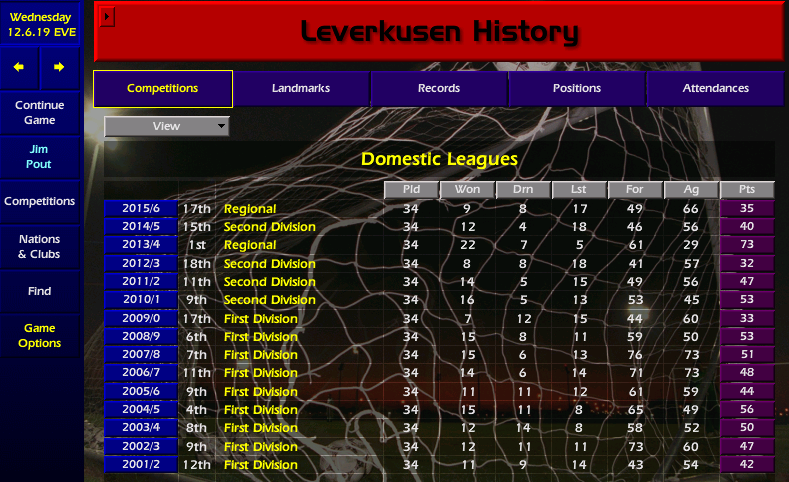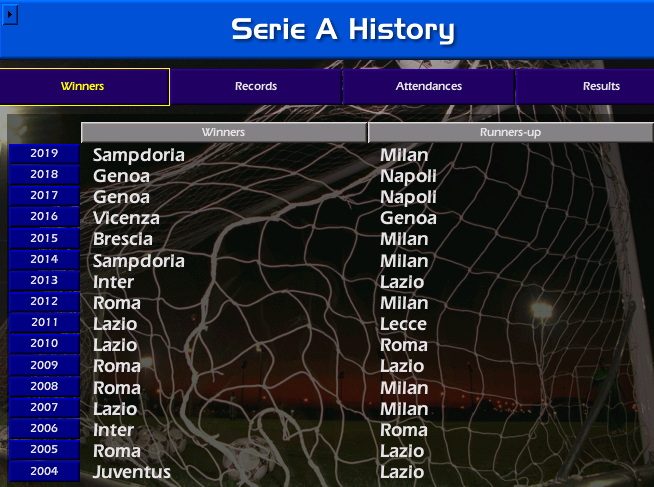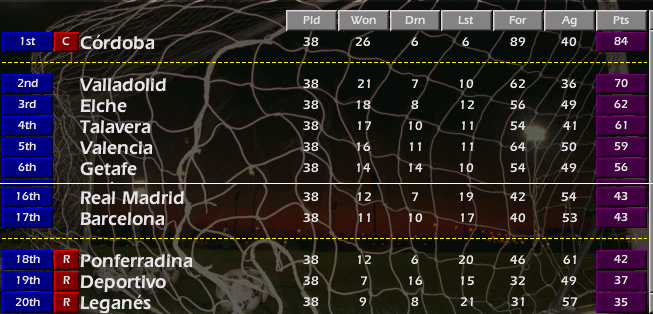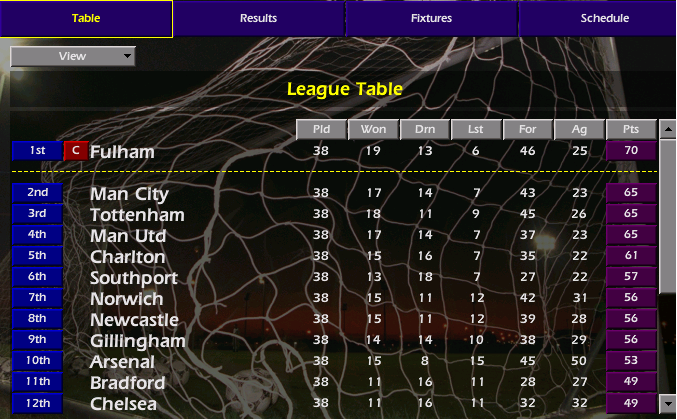Paper Teams, Paper Cups
By Shindig 0 Comments
Hi, Guys. For the past 15 years I've been religiously playing Championship Manager: Season 2001-2. It is timeless and, quite obviously of it's time. Back in August I started my latest save with the intention of seeing how far I could get with my beloved Newcastle before they threw me out. Whilst also trying (for about five minutes) to see if I could break records with Shola Ameobi and Jamie McClen. Those ideas went out the window when I started taking this seriously but the game clock is now in 2019, I've decided to focus on the larger things.
Football is killing itself.
Year Zero
Firstly, as this is science, I'll lay out the variables of August 2000, as devised by the good (well, apart from Miles) people at Sports Interactive.
- Prize and TV money will remain at current levels forever. No inflation is modeled in the game so you can bank on certain financial aspects. ITV Digital hasn't went under, there will be no Russian Oligarchs, Asian businessmen or Arab consortium looking to influence the footballing world. There will be no financial crisis.
- EU membership will remain static. No new nations will enter, no new nations will leave. No new nations will gain or lose FIFA membership.
- World Cup hosts up until and including 2006 are already chosen.
- FIFA's rules on unprotected contracts come in. With two years remaining on their contract, players are free to negotiate with other clubs.
- Competition formats remain as they are in 2001.
- The version I'm playing is 3.9.60. The vanilla retail database. English, German, Italian and Spanish leagues are running.
And for reference, here are my active years of service, roles and silverware so you know where my (well, alias Jim Pout) influence has been:
Newcastle United (2001-2013) - FA Cup (2005), Charity Shield (2005), League Cup (2009, 2011), UEFA Cup runners up (2009), Premier Division (2011)
Leeds United (2013-2015) - FA Cup (2014), Charity Shield (2014) UEFA Cup (2015)
China (2013 - Present) - Asian Cup runners up (2016)
Wigan Athletic (2018 - Present) - Second Division (2019)
With that covered, let's get to the bigger picture.
Global Matters
One of the things I was really keen to discover was how the game would deal with a static financial system. In reality, 2016's football finances have continued to boom as new TV deals, ownerships and markets come to pass. In the world of CM 01-02, it turns out the AI managers live within their means. Now, I don't have a save game editor so I can't dig through balance sheets. All I have to go on is some basic feedback whilst sums a club's financial state from Bankrupt to Rich but that barometer is good enough. It's a term relative to the level the club is playing at, too. I'll keep things focused to the top flight clubs.
The poorest top flight clubs I could find were: Palmese (ITA), Monza (ITA), Calgiari (ITA) Leganes (SPA). All of these have Insecure finances which you can consider below the breadline but not by much. Of these clubs, Palmese are the only ones able to avoid relegation this season which seems crucial to a club's financial wellbeing.
Artificial Stagnation
I say that because there are things I've discovered the AI will not do. As a manager, as your clubs grows you can improve training facilities and expand stadia to meet a growing fanbase. With that brings money. The AI managers will simply not do this unless it is legally required to do so.
For example, clubs in England are required, as part of the Taylor report to have an all-seater stadium when they reach the Premier League. As a result, there are about half-a-dozen clubs which now have modest expansions to comply with this. No club has expanded for the sake of it. Compare this to my two clubs Newcastle and Leeds which I expanded to 68,143 and 50,000 respectively. Facilities stay as they are and yet, clubs are generally getting richer as time goes on. I'm seeing less and less messages about clubs needing to sell talent to stay afloat. It used to happen with Alaves every year but years of top flight football have given them some security. It should be noted that in Italy and Spain, where the league ladder is shorter and there are no legal requirements to expand stadiums, the financial stability of clubs are on much weaker footing.
The richest of these nations appears to be Germany. In contrast, their stadia are massive with some great earning potential. This is entirely due to the game preparing Germany for 2006's World Cup. Those expansions were already written into the game and, as a result, the majority of Germany's top table are rich clubs. Just what do Dortmund do with a 147,000 capacity ground?
The Market
So we now come to how the AI handles transfers and player wages. In 2001, there was the beginnings of a transfer bubble which refuses to burst in 2016. Without the real-life factors coming into play, CM01-02 has largely cooled off the big-money signings. Rio Ferdinand's £41m move to Barcelona in 2006 remains the largest deal ever struck in this save. Since then, the £30m mark has been breached only once in 2018. Before that, the £20m barrier hadn't been beat for five years.
I think some of this can be put down to the unprotected contracts. Managers might simply just be waiting to buy a player's contract out. I can only hypothesize on that matter and, looking into it more, maybe the talent pool is such that the AI can find decent players on the cheap. Maybe these two factors combine to provide a self-sustainability where clubs are sitting on disposable income.
Wage demands have stabilised pretty easily. £120,000 a week was the limit by 2015 but, three years on, you're looking at £85,000 - £100,000 for a marquee player. Again, the game's financial sensibilities are kinda set so it's rare to see a trend bucked. I do kinda want to see how much money some clubs are sitting on. The Spanish contingent can't be too pretty with their 9,500 capacity stadiums and meager TV deals. In fact, let's move on to the real club stories of this odyssey.
Winners and Losers
Effectively, I'm looking at trends across the nations now to see if any dynasties truly emerge or wither. This is where the game gets the most interesting for me as a couple of eras have stood out. And, for reference, I consider dynasties to be clubs that take successive domestic titles and or European glory into account. Same kinda metrics for international sides.
Germany's Power Struggle
One thing that's usually certain about German football these days is that Bayern will coast it and, in the first few years of this save, the giants tended to prevail. Consecutive league titles coming in 2003-2005. Schalke threatened the title on four scattered occasions but only could grab one in 2007. Dortmund's status has somewhat waned over the years and, whilst stability under Matthias Sammer has probably lead to infinite money, success has been slim. What we have now in modern Germany is a power struggle which seems to have been won out by VfB Stuttgart. No consecutive titles but they dominated 2019 to add to their weirdly 24-month tradition of taking titles. Matthias Sammer having left Dortmund to take charge of them last season.
Nobody can keep a grasp on the German Cup and, as a result, smaller clubs are finding their way into finals. Dresdner and Kiel taking the silverware whilst not having league status. Sometimes that success spurs them on to become league and top flight clubs. Aachen seemingly a good example of it. As poor as Bayern have been, they did make it to a Champions League final this season and German clubs are fairing very, very well in Europe. I'm finding it to be a league where fighting on all fronts doesn't seem a priority. It's a trend we'll see with the others. A word on Leverkusen, too. They dropped out of the league structure completely five years ago and have never replaced their last manager. That's fairly bleak for a club I considered fairly well-established.

Italy's Power Vacuum
Whilst there's no real dominance to Italy's top clubs, you could always be assured of Milan or Roma fighting for silverware. For about a decade, this is definitely the case with Rome clubs seemingly shutting out Milan from capturing gold. It's particularly interesting in Milan's case because, whilst researching the numbers, they had five of the world's top paid players on their books. It looked, on paper like a dynasty but their success always came on the continent, rather than domestically. No club would retain a title until 2008 when Roma traded blows with city rivals Lazio. After that, they had two titles of their own. Genoa tried to fill the void with consecutive titles in 2017-18. The last two sides I mentioned also taking consecutive Italian Cups.
If it feels like I'm neglecting Juventus, it's because they've neglected themselves. One title and cup double in 2004 all they have to show for themselves. 2018 saw them related to Serie B. Roma having been relegated a year prior. Both clubs have recovered but only just. They struggle across a league that struggles to score goals. Sampdoria won the title despite 10 defeats.

Spain's Near Death Experience
So far we've seen nations where dominance is hard to come by where clubs have arrived, won and fallen within the space of a few years. 2010 marks the last time Barcelona or Real Madrid have secured a league title. Since then, like Italy a power vacuum emerged and, much like Germany, a struggle has been taking place. Now, I've mentioned before the modesty of the teams involved in Spain's top league. Talavera are perhaps the most successful of these minnows finishing runners up in 2009 and 2015. Eiche have also risen to prominence with a title win in 2015. Even Hercules are in on the act with a second-placed finish in 2018.
With this power vacuum came actual continental problems, though. Spain's UEFA coefficients plummeted due to these minnows struggling to make an impact on the European stage. They lost Champions League spots to the likes of Belgium and Croatia and the ones they retained were not seeded. In many ways, this is a glimpse into a Spain without the dependable big two clubs. In 2013, Barcelona were relegated. They would not return until 2016. Since then they have survived relegation by a single point for two seasons running. Real Madrid have yet to suffer the same fate but have come close twice in twelve years. This year they, like Barca, avoided the drop by a single point.
But all is not lost. In the wake of this, a dynasty has emerged. Cordoba have been a top flight side since 2002. They've consolidated over a period of a decade and, in 2014, were league runners up. It was a taste of near success and 2017 would see the first of their three successive titles. The last two have been dominant wins with 12 and 14 points of breathing space and, to top it all, they have been the only side in 14 years to retain the Champions' League. Financially, they're just about sustaining themselves with a rather small squad doing well to fight on all fronts.
It's a team almost exclusively of Spanish stock with the line being lead by an evergreen Fernando Torres. Buying and selling habits are somewhat sporadic with the bulk of their team being acquired years ago. It's kind of amazing and, with that success, Spain's stature in the European game may grow once more. They need competition, though.

The Death of English Football
Yep. I didn't want this blog to be too Anglo-centric but I discovered a sickness last night within the English league. It's been festering, brewing for years and it might just be terminal. Much like reality, England's clubs are backed, largely by TV money. As a result, those that establish themselves as top flight clubs can ultimately self-sustain themselves quite well. Behold Gillingham. Promted in 2008, they would finish runners up in 2013 and 2017. They have won League Cup and FA Cups in 2016 and 2012. Sam Allardyce and Glenn Hoddle brought the success but, since then, the weight of expectation has burst them. Torquay now are an established top side. In 2017, they won an FA Cup of their own but struggle at the wrong end of the table. Southport, perhaps the biggest rise of the English clubs, have finished their fourth season in the Premier League in a European spot.
In terms of true dynasties, Man Utd hold the standard with three league titles and two Champions Leagues in the span of four years (2003-2006). They maintained success until 2013 when Newcastle began three successive title reigns under Trond Solleim. I laid the tracks for that team. He drove the train. I came within 15 minutes of derailing it with my Leeds side in 2015. They now struggle to maintain league form and Trond has to bank on cup success keeping the sack at bay.
That's a theme you can gather from the English game. Fans are angry, fans are expectant. and it can go south so quickly. Southampton and Everton had Third Division football this season. One of the oldest clubs in England completing their plummet in the space of eight years. Aston Villa are set to do the same from the Second Division in what is Jermaine Defoe's first roll in management.
Arguably, the biggest worry about the Premier League is the product itself. A lot of games draw and are tightly contested affairs. Fulham took the title this year. They scored 46 goals all season. Two less than Tottenham's winning run last season. Turgid. On the final day of the season, only two games didn't contain a clean sheet. I don't know whether it's down to a genuine defensive goldmine or whether just too many clubs have large expectations, leading to depleted morale. If this continues, there'll be nothing left but scoreless draws.

As an addition to this, the FA have seen fit to employ an unproven Coach and an unproven Scout as England managers rather than... like, me or Charlton's Steve McManaman. Internationally, Argentina have retained the World Cup they won in 2014. My Chinese side drew with them in the group stages. We were shite. Europe's a shambles with Romania winning Euro 2016.
Moreso, this feels like the end of an era with the real players slowly retiring or moving into backroom roles. I'm sitting here contemplating whether to give Kim Kalltrom and Cherno Samba only last run. God knows what state the Premier League will be in once I get to it. Happy Christmas, guys. If you've made it this far you must already be drinking.
